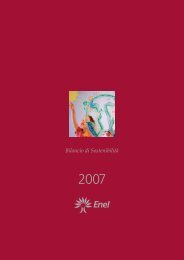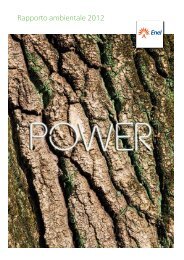Annual Report 2010 - Enel.com
Annual Report 2010 - Enel.com
Annual Report 2010 - Enel.com
Create successful ePaper yourself
Turn your PDF publications into a flip-book with our unique Google optimized e-Paper software.
incorporating the guidelines contained in IFRIC 8<br />
“Scope of IFRS 2”;<br />
- provide guidelines for classifying share-based payments<br />
in the consolidated financial statements and<br />
separate financial statements of the <strong>com</strong>panies involved;<br />
- specify the accounting treatment of equity-settled<br />
share-based payments involving different Group<br />
<strong>com</strong>panies, incorporating and expanding on the<br />
guidelines contained in IFRIC 11 “IFRS 2 - Group and<br />
treasury share transactions”;<br />
- specify the accounting treatment of cash-settled<br />
share-based payments involving different Group<br />
<strong>com</strong>panies, a situation not addressed by IFRIC 11.<br />
The retrospective application of the amendments –<br />
which replaced IFRIC 8 and IFRIC 11 – did not have an<br />
impact in the period under review.<br />
> “Revised IFRS 3 - Business <strong>com</strong>binations”: the new version<br />
introduces important amendments to the acquisition<br />
method for the recognition of business <strong>com</strong>binations.<br />
The changes include:<br />
- the obligation to recognize in profit or loss any<br />
changes in contingent consideration, as well as the<br />
transaction costs of the business <strong>com</strong>bination;<br />
- the possibility of opting for either the full goodwill or<br />
the partial goodwill approach in choosing the methodology<br />
for initial recognition of goodwill;<br />
- the obligation to recognize, in the case of the acquisition<br />
of additional holdings after acquiring control,<br />
the positive difference between the purchase price<br />
and the corresponding share of equity as an adjustment<br />
of equity;<br />
- the obligation to recognize in profit or loss the effects<br />
of the fair value measurement, at the date of<br />
acquisition of control, of the holdings acquired previously<br />
in business <strong>com</strong>binations achieved in stages.<br />
The application of the standard on a prospective basis<br />
did not have an impact in the period under review.<br />
> “IFRIC 12 - Service concession arrangements”. The interpretation,<br />
applied retrospectively as from January 1,<br />
2009, requires that, depending on the characteristics of<br />
the concession arrangements, the infrastructure used<br />
to deliver the public services shall be recognized under<br />
intangible assets or under financial assets, depending,<br />
respectively, on whether the concession holder has the<br />
right to charge users of the services or it has the right<br />
to receive a specified amount from the grantor agency.<br />
The new interpretation applies to both infrastructure<br />
166 <strong>Enel</strong> <strong>Annual</strong> <strong>Report</strong> <strong>2010</strong> Consolidated financial statements<br />
that the concession holder builds or acquires from a<br />
third party for the purposes of the service arrangement<br />
and existing infrastructure to which the concession<br />
holder is given access by the grantor for the purposes<br />
of the service arrangement. More specifically, IFRIC 12<br />
applies to service concession arrangements between<br />
public grantors and private operators if:<br />
- the grantor controls or regulates what services the<br />
operator must provide using the assets, to whom,<br />
and at what price; and<br />
- the grantor also controls, via ownership or other arrangement,<br />
any significant residual interest in the assets<br />
at the end of the term of the arrangement.<br />
On the basis of the analysis conducted with respect to<br />
the concession for the distribution of electricity operated<br />
in Italy, the conditions for application of IFRIC 12<br />
do not apply, as the concession holder has full control,<br />
as defined in the interpretation, of the infrastructure<br />
serving the electricity distribution service. The provisions,<br />
however, are applicable to the infrastructure<br />
serving the electricity distribution concessions held by<br />
the Endesa Group <strong>com</strong>panies operating in Brazil.<br />
The effects of the application of the interpretation are<br />
discussed in note 4 to the consolidated financial statements.<br />
> “IFRIC 15 - Agreements for the construction of real estate”.<br />
This interpretation sets out the guidelines for recognizing<br />
revenues and costs arising from the contracts<br />
for the construction of real estate and clarifies when a<br />
contract falls within the scope of “IAS 11 - Construction<br />
contracts” and “IAS 18 - Revenue”. The interpretation<br />
also specifies the accounting treatment to be used in<br />
respect of revenues from the delivery of additional services<br />
relating to real estate under construction.<br />
The interpretation was not applicable to the Group.<br />
> “IFRIC 16 - Hedges of a net investment in a foreign operation”.<br />
The interpretation applies to entities that intend<br />
to hedge the exchange rate risk associated with a net<br />
investment in a foreign operation.<br />
The main aspects of the interpretation are:<br />
- the hedge may only cover the exchange rate difference<br />
between the functional currency (not the presentation<br />
currency) of the foreign operation and the functional<br />
currency of the parent (a parent being a controlling entity<br />
at any level, whether intermediate or final);<br />
- in the consolidated financial statements, the risk<br />
may be designated as hedged only once, even if<br />
more than one entity in the same group has hedged









